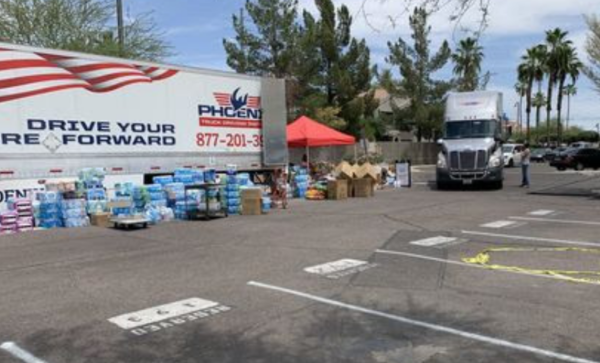
- Details
- By Native News Online Staff
PHOENIX — Last Friday, the Phoenix Indian Center sent three semi-trucks filled with basic household needs to the Navajo Nation. The items are much needed on the country’s largest reservation that has been hit hard by the COVID-19 coronavirus.
Given the proximity to the Navajo Nation, the Phoenix Center has a staff that havehas many connections to the Navajo Nation and serves many Navajo people who live off their reservation and live in the Phoenix metropolitan area.
So, they decided to have a drive to collect items to be sent to the Navajo Nation. The goal was to fill one semi-truck. Their collections far exceeded their goal. Within one week, the center collected enough items to fill three trucks.
“Due to curfews designed to slow the spread of the virus, many people can’t go out and get what they need. And 30 percent of households don’t have running water. These donations will make a huge difference in the lives of the Navajo people,” Patricia Hibbeler, CEO of the Phoenix Indian Center said.

Supplies collected included bottled water, cleaning supplies, nonperishable food items, pet food, diapers, and more. Many Phoenix area residents and dozens of businesses contributed to the success of the drive.
Among those donated were Arizona State University students, Arizona Warriors basketball players and parents, and local community members. Other donors include Encompass Health, Synchrony Financial, the Harding Law Firm, Maricopa Humane Society, and Hickmans Family Farms.
The donations were delivered to the Navajo Nation by Phoenix Truck Driving Institute, Southwest Truck Driver School, and Swift Transportation.
“We are so grateful to everyone who came out in support of the Navajo Nation, we are truly overwhelmed with emotion,” Patricia Hibbeler, CEO of the Phoenix Indian Center added.
"We would like to thank our local community and all our business partners for the quick response and generous support. Being from the Navajo Nation, this project was extra meaningful to me. We hope this collective effort will have a positive impact on the families who are in dire need during this difficult time,” Phoenix Indian Center Development Director Jolyana Begay-Kroupa added.
Navajo Nation Vice President Myron Lizer was on hand for the delivery on Friday and offered words of appreciation to the Phoenix Indian Center team. Later, he and Navajo Nation President Jonathan Nez thanked the Phoenix Indian Center for it coming to the assistance of the tribe in a news release.
"We have over 35,000 Navajo citizens that reside within the Phoenix area and we know many of them are contributing by donating things to our communities and it’s wonderful that they along with many others are giving back to their home communities here on the Navajo Nation. The teachings of K’é and T’áá Hwó’ajít’éego, or self-reliance, have brought our tribal communities together during this difficult time," Navajo Nation President Jonathan Nez said.
More Stories Like This
Native News Weekly (August 25, 2024): D.C. BriefsUS Presidents in Their Own Words Concerning American Indians
NDAA passes House; Lumbee Fairness Act Advances
NFL, Vikings to Host Native All-American Game, Youth Flag Clinic
Senate Committee on Indian Affairs Passes 12 Bills to Strengthen Tribal Communities
Help us defend tribal sovereignty.
At Native News Online, our mission is rooted in telling the stories that strengthen sovereignty and uplift Indigenous voices — not just at year’s end, but every single day.
Because of your generosity last year, we were able to keep our reporters on the ground in tribal communities, at national gatherings and in the halls of Congress — covering the issues that matter most to Indian Country: sovereignty, culture, education, health and economic opportunity.
That support sustained us through a tough year in 2025. Now, as we look to the year ahead, we need your help right now to ensure warrior journalism remains strong — reporting that defends tribal sovereignty, amplifies Native truth, and holds power accountable.
 The stakes couldn't be higher. Your support keeps Native voices heard, Native stories told and Native sovereignty defended.
The stakes couldn't be higher. Your support keeps Native voices heard, Native stories told and Native sovereignty defended.
Stand with Warrior Journalism today.
Levi Rickert (Potawatomi), Editor & Publisher

